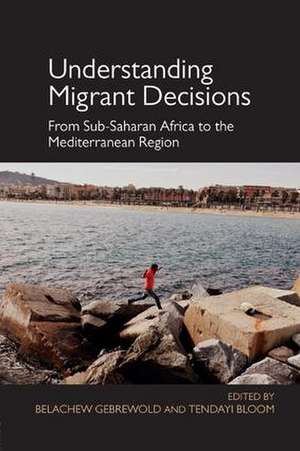Understanding Migrant Decisions: From Sub-Saharan Africa to the Mediterranean Region
Autor Belachew Gebrewold, Tendayi Bloomen Limba Engleză Paperback – 14 aug 2018
Preț: 238.85 lei
Preț vechi: 287.61 lei
-17% Nou
Puncte Express: 358
Preț estimativ în valută:
45.71€ • 47.22$ • 38.02£
45.71€ • 47.22$ • 38.02£
Carte tipărită la comandă
Livrare economică 20 martie-03 aprilie
Preluare comenzi: 021 569.72.76
Specificații
ISBN-13: 9781138361201
ISBN-10: 1138361208
Pagini: 258
Dimensiuni: 156 x 234 x 27 mm
Greutate: 0.34 kg
Ediția:1
Editura: Taylor & Francis
Colecția Routledge
Locul publicării:Oxford, United Kingdom
ISBN-10: 1138361208
Pagini: 258
Dimensiuni: 156 x 234 x 27 mm
Greutate: 0.34 kg
Ediția:1
Editura: Taylor & Francis
Colecția Routledge
Locul publicării:Oxford, United Kingdom
Cuprins
Introduction: Understanding Migrant Decisions: From Sub-Saharan Africa to the Mediterranean Region Chapter One: Insecurity and Migration from the Horn of Africa Chapter Two: Liminality and Migrant Decision-Making in the Aftermath of the Political and Refugee Crises in the Mediterranean, 2010-2013 Chapter Three: Contested views of the causes of rural to urban migration amongst pastoralists in Niger Chapter Four: Autonomy in Times of War? The Impact of the Libyan Crisis on migratory decisions Chapter Five: Privatised Migration Management in the Mediterranean Region and Sub-Saharan Migration Decision-Making Chapter Six: Navigating the Eastern Mediterranean: The Diversification of sub-Saharan African Migration Patterns in Turkey and Greece Chapter Seven: Morocco as a destination for labour migrants? Experiences of Sub-Saharan migrants in the call centre sector Chapter Eight: Gendered Differences in Migration and Return: Perspectives from Ethiopia Chapter Nine: ‘Living without Possibility’: The Implications of the Closure of an Autonomous Space created by Undocumented Sub-Saharan Metal Scrap Collectors in Barcelona, Spain Chapter 10: ‘You make a decision and you start your journey’: reflections of a Ghanaian economic migrant and founder of the NGO, CEHDA Chapter 11:Conclusions and Recommendations
Notă biografică
Belachew Gebrewold is Professor of international relations and head of department of social work and social policy at Management Center Innsbruck, an Entrepreneurial School. His research areas are international security, conflicts and migration.
Tendayi Bloom co-edited this book as a Research Fellow at the United Nations University Institute on Globalization, Culture and Mobility in Barcelona, Spain. She is currently a Postdoctoral Associate at Yale University's Macmillan Center, in the Global Justice Program, exploring aspects of noncitizenship, statelessness, migration and justice.
Tendayi Bloom co-edited this book as a Research Fellow at the United Nations University Institute on Globalization, Culture and Mobility in Barcelona, Spain. She is currently a Postdoctoral Associate at Yale University's Macmillan Center, in the Global Justice Program, exploring aspects of noncitizenship, statelessness, migration and justice.
Recenzii
"This volume creates a deeper understanding of the root causes and the reasons for migration contributing to the current refugee crisis. It is a must read for all who want to learn more about one of the biggest challenges humanity faces as a result of deteriorating living conditions for so many." - Henning Melber, Dag Hammarskjöld Foundation, Sweden.
Descriere
Considering how changing conditions in the Mediterranean Region have affected the decisions of those considering migrating from Sub-Saharan Africa to or through the Region, this book represents an important and overdue contribution to international policy-making and academic discourse. In current discussions relating to this migration phenomenon, the complexity of individual decision-making are left unacknowledged and hence subsequent policy responses draw upon simplified models. In this volume, individual decision-making takes central stage by bringing together contributions demonstrating very different types of decision-making frameworks.
